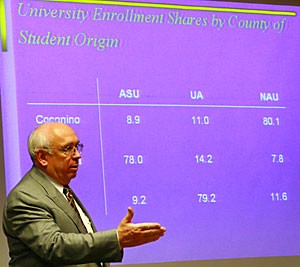While Pima County does well in awarding a high number of bachelor’s degrees in the state, Arizona as a whole is ranked poorly in education compared with the rest of the nation, according to a study conducted by the National Center for Higher Education Management Systems.
Future economic downfalls could occur in Southwestern states, including Arizona, where education opportunities are dwindling for younger generations, said Dennis Jones, president of NCHEMS.
Jones said part of the problem is that high school education in Arizona is not preparing students for college admission.
“”Arizona is fairly far down the educational attainment ladder when it comes to high school students with diplomas and baccalaureate degrees,”” Jones said.
About 408,522 people in Arizona have baccalaureate degrees, Jones said. In order to be on par with the national average, Arizona must deliver an additional 78,987 degrees.
In future years, the population of Hispanics in Arizona will exceed that of Caucasians, Jones said. Coupled with the fact that Hispanics are statistically less likely to attain a bachelor’s degree, this also points toward large economic and financial pitfalls for the state of Arizona if significant changes do not occur in minority attainment levels.
“”Arizona has a lot more students coming in of a type that has not been successful in higher education,”” Jones said. “”If we don’t find a way to be accessible to different types of people, the whole future of the country is shaky.””
But education does pay well in Arizona, Jones added.
Students who obtain an associate degree are likely to make about $11,000 more annually than those with a high school diploma, and for those who obtain a baccalaureate degree, the difference is about $20,000.
“”Having an education clearly pays,”” Jones said. “”There are just not enough people that have the education.””
By 2025, Pima County will grow by 516,411 persons, and 79 percent of Pima County high school graduates are projected to attend the UA, Jones said Health professions and teaching positions are in high demand in Pima County, Jones said.
“”In-state students would have a leg up in health professions and aerospace, if there were more of them,”” Jones said.
But because the number of university graduates is below the number of available jobs, Arizona employers are hiring workers from out of state.
The solution to some of these problems is for Arizona high schools, community colleges and universities to work together in outlining curriculum, said Roy Flores, chancellor of Pima Community College.
“”What’s expected in high school is not what is expected in college,”” Flores said.
Educators and legislators alike must convince others of the importance of working together toward bettering education, said Brenda Even, a member of the Pima Community College Board of Governors.
“”We are trying to get ourselves in a position to be able to help solve this problem,”” Even said.
Arizona is fairly far down the educational attainment ladder when it comes to high school students with diplomas and baccalaureate degrees.
– Dennis Jones, president of NCHEMS
While better collaboration with the university system is necessary, informing the community of education and job availability is also important, added Marty Cortez, a member of the PCC Board of Governors.
“”The alignment of curriculum is crucial here,”” Cortez said. “”Finding a program is one thing, but marrying a student up to that program is another thing.””
Flores said the study will be shown to the Arizona Board of Regents, as well as higher education administrators and legislators, in an effort to correct anticipated problems before they occur.









